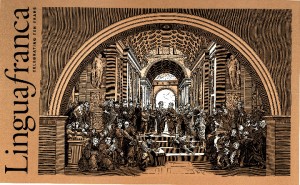Dr. Esther Ra, Career Counselor
Hello and happy spring! If you find yourself giddy with a bounce in your step while walking along Locust Walk, we welcome your spring fever. As Doug Larson said, “Spring is the when you feel like whistling even with a shoe full of slush.” I have found that certainly to be true this time of year, when Locust Walk is swarmed with banners announcing end-of-the-year activities, and the campus is abuzz with pre-finals jitters. I hope that despite the semester drawing to a close and the inevitable stress that accompanies this juncture, you can take a moment to breath in the sweet, spring air and bask in the warmth of the sun.
Please allow me to introduce myself. I am the newest advisor to students in the schools of Nursing, Education, and Social Policy and Social Work. I am a proud alum of Penn, graduating with my doctorate in Language and Literacy Education from the Graduate School of Education. During my doctoral studies, I had the privilege of working with teachers in the Penn-assisted schools, helping to lift all facets of literacy in K-2 classrooms through professional development. I also worked in the higher education classroom teaching graduate students. Before coming to Penn, I earned my master’s in Curriculum and Teaching from Teachers College, Columbia University and my Certificate in ESL from Biola University and went on to teach elementary grades in public and private schools in New York City and New Jersey. In addition, after college, I lived and worked in Seoul, Korea teaching English as a Foreign Language. My formidable undergraduate years were spent at Barnard College, Columbia University majoring in English and minoring in Sociology. Yes, I am a Big Apple enthusiast and I still miss “the city that never sleeps.” Currently, I am also an Adjunct Professor, teaching research courses to literacy/ESL teachers at Cabrini University. In a nutshell, that’s me.
—
Now, to address one of the most frequently asked questions I encounter as an advisor:
FAQ: Should I include all my volunteer work and extra-curricular activities on my resume and/or CV?
Answer: Yes and no. When included and written appropriately, such information can be of high interest to most employers. How one has developed transferrable skills outside of paid employment opportunities, and the kinds of experiences one has chosen to gain shows a potential employer your interests, passions, and causes you hold in high regard.
According to a LinkedIn survey, 41% of hiring managers found that the opportunities gained in volunteering and extra-curricular activities were equally important as direct work experiences[1]. Many times, graduate students have shared with me that they they opted to leave out their volunteer work and campus leadership positions, because it either did not seem related to the job they were applying to or rather seemed out of place on their resume. Also, they felt that their resumes were too lengthy and these extra-curricular activities seemed to be the least important. This is a common mistake and in doing so, without realizing it, students are censoring their experiences to only show for what directly relates to the job they hope to obtain. If it was required that individuals only put direct experience for a job posting on their resume, it is quite likely that so many would not be able to land an interview, much less be offered a job. When written appropriately, volunteer and extra-curricular activities, can illuminate important transferable skills that can be used in any given position.
Moreover, any transferable skills gained through volunteer opportunities and through campus and community involvement can include an array of leadership, interpersonal, organization, or communication skills. For example, collaborating on a team, or self-management on a project, or relating with specific populations of people are all skill sets that you can apply to in any given job. These are also skill sets that need to be developed over time and nurtured through experience. Universally, they can be valuable in most fields and industries.
In addition, the volunteer experiences and community involvement pieces on a resume may set an individual apart from the stack of other resumes read by potential employers. Undeniably, these particular sections on the resume create colors, rather than appear so black and white. Many times such experiences can spark a point of interest or commonality with an interviewer and strikingly create an unexpected connection with a potential employer.
As a career advisor and teacher educator, I have gained innumerable transferable skills over the years. I appreciate that on interviews I have been asked about the professional book club I initiated as a lead teacher in my district, or been asked to share about my campus student leadership roles. Notably, I have also had the opportunity to share about my favorite work experiences as a volunteer on a Native reserve in Saskatchewan, Canada, or as a volunteer curriculum developer in Padang, Indonesia. Furthermore, though not directly related, I have also had the extraordinary experience of volunteering in Bomet, Kenya on an American hospital compound working on public health initiatives. While none of these positions were paid or even directly related, I gained valuable interpersonal skills, cross-cultural communication, as well as leadership and project management experience. These experiences also conveyed to employers my continued interest in international development work in education and beyond.
As the spring semester winds down, the hustle and bustle of students wrapping up their classes and making plans for the summer are imminent. In the midst of the finals flurry, please take time to stop by Career Services and check in with one of the advisors. Come visit us and we are more than happy to help you frame your volunteer experiences to convey transferrable skills.
It is from experiences such as mine that we get our education of life.”- Mark Twain
[1] https://www.slideshare.net/LinkedinforGood/linkedin-101-create-a-profile-and-learn-the-basics





